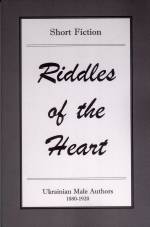| Home |
| Publications |
| Public Events |
| Press Releases |
| Reviews & Resources |
| Personnel |
| Contact |
| Orders |
| Search |
Language Lanterns wins CFUS translation prize
Language Lanterns donates books to Ukrainian universities. Details
Ukrainian Male Authors 1880-1920
Riddles of the Heart
Introduction

Selected Short Fiction by
Mykola Chernyavsky (1868-1946)
Ivan Franko (1856-1916)
Hnat Khotkevych (1877-1938)
Mykhaylo Kotsybynsky (1864-1913)
Osyp Makovey (1867-1925)
Mykhaylo Mohylyansky (1873-1942)
Panas Myrny (1849-1920)
Leonyd Pakharevsky (1883-1941)
Valeriyan Pidmohylny (1901-1937)
Stepan Vasylchenko (1879-1932)
Volodymyr Vynnychenko (1880-1951)
Translated by Roma Franko
Edited by Sonia Morris
©2004 Language Lanterns Publications
ISBN 0-9735982-1-2
Language Lanterns Publications initiated its publishing program in 1998 with the series Women’s Voices in Ukrainian Literature. The purpose of this six-volume set was to introduce selected works written by eight women authors between 1880 and 1920 to the English-reading world. This book, Riddles of the Heart, and its companion volume, Passion’s Bitter Cup, continue to fill in "blank spots" in Ukrainian literature in translation by making a broad array of stories with love and erotic themes from this significant forty-year literary period accessible to readers of English.
The short fiction of the fourteen male authors selected for these two anthologies complements and supplements the works of their female counterparts, but its tone is more direct, more honest, and more daring. Some of the stories were deemed immoral or amoral, and their authors were censured by more conservative peers. The works considered a threat to the social order were censored and banned, and as was true of similar groundbreaking literature in Western Europe, did not become generally available to Ukrainian readers until several decades or even a century later. To the best of our knowledge, this is the first time the stories in these anthologies are being published in English translation.
The risqué content that scandalized the reading public of the day has long since lost its shock value. Today’s reader is more likely to commend these writers for their thoughtful exploration of issues of morality and equity in male-female relationships, and their courageous depictions of sordid and unsettling aspects of life, persistent social problems that, in polite society, were not to be talked about—and that some of us still prefer not to address.
It should be noted, however, that, in sharp contrast to writing that is sexually explicit, deliberately titillating, or obscene, these stories are not offensive or pornographic. They are literary in their conception, and their intent is to inform, arouse empathy, and prompt rational and dispassionate examination of the motivation, convictions, and behaviours of the protagonists. In sum, erotic themes are embedded in the psychological and social zeitgeist of that era.
This zeitgeist, or spirit of the times, rooted in the transformative ideologies and societal upheavals of this period in East European history, rocked the foundations of civil society and had a profound effect on the emancipated intelligentsia. Hedonism, free love, and the sheer joy of being became the mantras of intellectually engaged young people caught in the maelstrom of challenges to the status quo: revolutionary political, social, and economic movements, anti-clericalism, feminism, and a fanatical intolerance of dogmatism, moral rigidity, and hypocrisy. Their struggle to understand the multifaceted personal and societal ramifications of freedom of choice, strike a balance between individual freedom and social reponsibility, and cope with the often catastrophic consequences of an unfettered, narcissistic lifestyle captured the imagination of the authors featured in these anthologies.
The stories in Riddles of the Heart vary thematically, stylistically, and in terms of their literary merit, but they have one overarching motif: the age-old riddle of love relationships between men and women. Specifically, they explore the often puzzling manifestations of physical attraction, sensuality, and desire, and the unfathomable course of passionate love as it flourishes and is sustained, or wanes and vanishes.
Some of the stories are sentimental and romantic, with a focus on the histrionic reactions of adolescents to the vicissitudes of first love and doomed liaisons. Others depict the social and economic dependence of women, the double standard by which men and women in non-marital relationships were judged, and the ultimately disastrous consequences, for women, of flouting social mores.
In contrast, several stories portray women as Jezebels who exercise the demonical power of their sexuality to ensnare hapless men and use them to better their lot in life or satisfy a deeply rooted need for adulation, power, and independence. Thus, in an extreme instance of role reversal, a protagonist in one of the stories, a liberated woman, callously takes advantage of a man’s infatuation to attain her personal goal of motherhood unencumbered by marriage. Finally, one story turns the tables on feminists by making a tongue-in-cheek case for the emancipation of men and the implementation of gender equality in the societal norms governing marriage.
The content of this book and its companion volume provides a fascinating glimpse into life as it was lived in urban Ukraine at the turn of the twentieth century—a time of social unrest, shifting mores, and heady affirmations of freedom of choice. Some of the content is simply human—universal, familiar, and predictable, and some of it is bound to a paricular time and place, but taken together, the stories illuminate the social history of a part of the world that is still reaping the wild wind of its turbulent past.
Sonia Morris, Editor
Riddles of the Heart Author Notes
